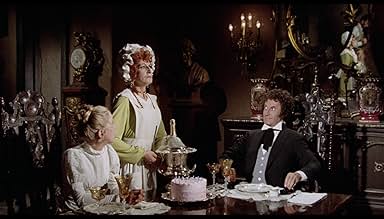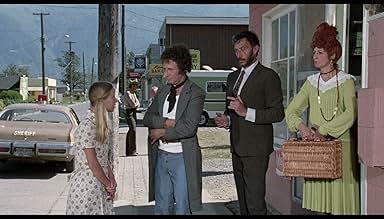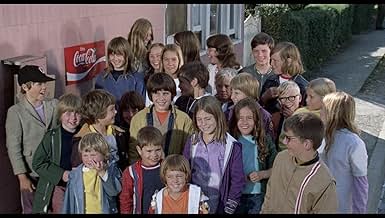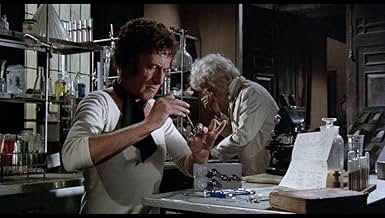Ajouter une intrigue dans votre langueA mute puppeteer uses a deceased scientist's invention to control dead bodies like puppets.A mute puppeteer uses a deceased scientist's invention to control dead bodies like puppets.A mute puppeteer uses a deceased scientist's invention to control dead bodies like puppets.
- Réalisation
- Scénario
- Casting principal
- Nommé pour 1 Oscar
- 1 nomination au total
Avis à la une
When one thinks of Marcel Marceau they think of the world's most famous mime. A performer who has entertained millions of people throughout the years with his mastery of pantomime. You certainly don't think of him as a manipulator of dead bodies!! But that's what he is here in this very strange film. He plays Malcolm Shanks, a mime who loves to entertain the neighborhood children. He lives with his sister & brother-in-law who are a shrew & a drunk & abuse him constantly. He is hired by a scientist who has perfected the art of reanimating the dead. I must stop for a second and let anyone who is reading this know that the film, while it sounds intriguing, doesn't play out the way you would think. It is at heart a fairy tale. A morality story perhaps. But most definitely NOT a horror story. To continue, The scientist dies & having learned his secrets while working with him, Malcolm reanimates his corpse & becomes very proficient at it. I'm not gonna get any deeper into it at this point. Suffice it to say that more than a few people get their corpses reanimated by Malcolm and no good can come from that.....
Marceau plays both Malcolm & The Scientist(Walker) & performs admirably in both roles. There is a scene where Malcolm learns to animate Walker's facial muscles that is very effective. He goes from slack-jawed to smiling so slowly & eerily that at first you think the film is frozen. Almost like time lapse photography. It really shows off Marceau's expertise. There is very little dialogue in the film. It plays like a silent film(It even has title cards)because it is 90% silent. The score by Alex North is therefore very important to the tone of the film, & it is very effective in conveying the mood that the filmmakers were trying to achieve. It was so effective it was nominated for an academy award.
I enjoyed the film but there are VERY SLOW PASSAGES in it. So slow that it will turn many people off. It also ends very curiously. It is a very odd but lyrical film that is a great attempt at a Grim fairy tale. But ultimately it fails because of it's terrible pacing & low budget. You might dig it if you're willing to accept it's idiosyncracies. If not...well give it a try anyway. Who knows??
Marceau plays both Malcolm & The Scientist(Walker) & performs admirably in both roles. There is a scene where Malcolm learns to animate Walker's facial muscles that is very effective. He goes from slack-jawed to smiling so slowly & eerily that at first you think the film is frozen. Almost like time lapse photography. It really shows off Marceau's expertise. There is very little dialogue in the film. It plays like a silent film(It even has title cards)because it is 90% silent. The score by Alex North is therefore very important to the tone of the film, & it is very effective in conveying the mood that the filmmakers were trying to achieve. It was so effective it was nominated for an academy award.
I enjoyed the film but there are VERY SLOW PASSAGES in it. So slow that it will turn many people off. It also ends very curiously. It is a very odd but lyrical film that is a great attempt at a Grim fairy tale. But ultimately it fails because of it's terrible pacing & low budget. You might dig it if you're willing to accept it's idiosyncracies. If not...well give it a try anyway. Who knows??
And that's not an exaggeration. I searched for this movie for a long time, and I'm glad I found it. Marcel Marceau plays Shanks, a deaf puppet maker, and Walker, an old scientist who has discovered the secret of reanimating the dead. He plays both beautifully, using his pantomime skills to achieve silent movie style acting. In fact, that's what this movie reminds me of - a silent fairy tale (the use of title cards to introduce scenes further suggests this), with a little George Romero thrown in! It's incredible that something this abstract and individualistic was made; I wish more movies would be as bold. The opening credits sequence, with tinted photos of kids watching Shanks' puppet show while the weird Oscar nominated (!) music plays is incredibly strange, memorable, and disturbing.
William Castle, of all people, directed. This movie shows, more than any other, that he was more than just the "King of Gimmicks". To see such an expressionistic and disturbing vision.......is to regret that this was his final film as director.
William Castle, of all people, directed. This movie shows, more than any other, that he was more than just the "King of Gimmicks". To see such an expressionistic and disturbing vision.......is to regret that this was his final film as director.
I am sure the cult followers of this film will not like my review, but that's partly what makes this film a cult classic--either you like it or you don't. Even with nothing else to do on a late Friday night, and a stiff drink, a bag of chips, and the need to escape from the cares of the week, I found myself flipping to other channels during the painfully slow segments of this film. The (un)editing and overall incredibly slow flow of this story made it a struggle to stay tuned in. If properly edited, it could have easily been a half-hour "Tales from the Dark Side." In fact, the quality of the shots and lighting made me convinced that it was a made-for-TV film.
All that said, it's interesting to see the movie once, as if it was assigned in a "70s film appreciation" class. But be prepared with something else to do--like sorting receipts for taxes, or playing solitaire.
You may find yourself yelling at the screen--"How many times does the editor have to cut back to his face? We've got the point! Now move on with the action!!!" and, "could he walk down that hallway any slower???" My favorite part of the movie was watching the great body movement of the actors who played the re-animated zombies. And it's funny that Marcel was NOT the best one of these!
All that said, it's interesting to see the movie once, as if it was assigned in a "70s film appreciation" class. But be prepared with something else to do--like sorting receipts for taxes, or playing solitaire.
You may find yourself yelling at the screen--"How many times does the editor have to cut back to his face? We've got the point! Now move on with the action!!!" and, "could he walk down that hallway any slower???" My favorite part of the movie was watching the great body movement of the actors who played the re-animated zombies. And it's funny that Marcel was NOT the best one of these!
This must surely be one of the most neglected fantasy films of all time. By all accounts a flop at the time of it's release, it has become the hardest to see of all William Castle's movies. It's also in colour, which is another rarity from this director. French mime/actor Marcel Marceau plays the title role of Malcolm Shanks, a deaf mute puppeteer who scratches out a living putting on shows for children, while bearing the brunt of a miserable home life with his money grabbing brother and sister-in-law, who take all the money he earns for themselves. One day, an elderly professor (also played by Marceau in a dual role) sees his puppet show and offers Shanks a job - to come to his home to assist him is some experiments involving the artificial stimulation of dead animals via electricity, or something...why or how it actually works is not expanded on, but it involves small implants being attached to the muscles and these are then activated by means of a small control box.
Due to his background with puppets, Shanks proves to be very adept at controlling the movement of his first animals (a dead frog, and later a rooster). However things take an unexpected turn when he turns up for work one day only to find the professor dead in his armchair, seemingly from natural causes. Shanks has all but been hounded out of his own home by his cruel relatives, and he realises that desperate measures are needed to avoid going back there...and so the professor becomes the first human subject for re-animation.
What follows is the beginning of a macabre and dreamlike fantasy. The "awakening" of the dead professor is one of the most ghoulish things I have ever seen. Marceau is famous as a physical performer, and his depiction of a dead body being artificially roused into movement is very skillful. With a shock of white hair, sunken face and glazed white eyeballs, the professor's body jerks up off the ground and begins to wobble around the laboratory, as Shanks perfects his manipulation of the control box. It isn't long before he feels confident enough to take his new puppet on a stroll into the streets outside, and this is the start of an escalation of events that you really need to watch to get the full enjoyment out of.
This is almost a silent movie for much of it's running time, with long scenes involving no dialogue whatsoever, but the film is so effective in holding your attention that you will barely even notice the fact that nobody is talking. Shanks himself never speaks at all, but the support character all talk naturally when required - except for when they are dead of course! And some rather charming silent movie-style subtitle boards on the screen fill in any required exposition. The acting in this film is amazing, I suspect that Marceau is not the only performer to have a background in mime or theatre, as when he has to animate other dead characters, the movements are always effectively creepy.
If I have any criticism, it would be that Castle - as he has often done before - stays shy of making the film as truly horrific as it could have been. He never exploits the "yuk" factor of the dead bodies, and there is no allusion to bloodshed or decomposition at any time. William Castle is an oddity among horror directors in that he always puts on the brakes before his subject matter goes to deep into unpleasant territory, whereas others would gleefully revel in the more gruesome aspects of a story like this, Castle seems to prefer to keep things suitable for family viewing! Plus, the movie even ends with a tacked on "it's only make-believe" epilogue that completely squashes the very dark ending of the real story...it's something he has done before, and it seems a shame that the films of William Castle are often sabotaged from being truly horror by the directors very own sensibilities.
That notwithstanding, I would call "Shanks" a success, as it holds your attention constantly throughout. If any one thinks Marcel Marceau's talents end with a white made-up face and leotard, they should see him in this...he is perfect for the part, effective in bringing his whole character to life without speaking a single word. The film is a true oddity, but almost impossible to classify. Ultimately, it's just a unique and bewildering experience, and I think everyone should see it.
Due to his background with puppets, Shanks proves to be very adept at controlling the movement of his first animals (a dead frog, and later a rooster). However things take an unexpected turn when he turns up for work one day only to find the professor dead in his armchair, seemingly from natural causes. Shanks has all but been hounded out of his own home by his cruel relatives, and he realises that desperate measures are needed to avoid going back there...and so the professor becomes the first human subject for re-animation.
What follows is the beginning of a macabre and dreamlike fantasy. The "awakening" of the dead professor is one of the most ghoulish things I have ever seen. Marceau is famous as a physical performer, and his depiction of a dead body being artificially roused into movement is very skillful. With a shock of white hair, sunken face and glazed white eyeballs, the professor's body jerks up off the ground and begins to wobble around the laboratory, as Shanks perfects his manipulation of the control box. It isn't long before he feels confident enough to take his new puppet on a stroll into the streets outside, and this is the start of an escalation of events that you really need to watch to get the full enjoyment out of.
This is almost a silent movie for much of it's running time, with long scenes involving no dialogue whatsoever, but the film is so effective in holding your attention that you will barely even notice the fact that nobody is talking. Shanks himself never speaks at all, but the support character all talk naturally when required - except for when they are dead of course! And some rather charming silent movie-style subtitle boards on the screen fill in any required exposition. The acting in this film is amazing, I suspect that Marceau is not the only performer to have a background in mime or theatre, as when he has to animate other dead characters, the movements are always effectively creepy.
If I have any criticism, it would be that Castle - as he has often done before - stays shy of making the film as truly horrific as it could have been. He never exploits the "yuk" factor of the dead bodies, and there is no allusion to bloodshed or decomposition at any time. William Castle is an oddity among horror directors in that he always puts on the brakes before his subject matter goes to deep into unpleasant territory, whereas others would gleefully revel in the more gruesome aspects of a story like this, Castle seems to prefer to keep things suitable for family viewing! Plus, the movie even ends with a tacked on "it's only make-believe" epilogue that completely squashes the very dark ending of the real story...it's something he has done before, and it seems a shame that the films of William Castle are often sabotaged from being truly horror by the directors very own sensibilities.
That notwithstanding, I would call "Shanks" a success, as it holds your attention constantly throughout. If any one thinks Marcel Marceau's talents end with a white made-up face and leotard, they should see him in this...he is perfect for the part, effective in bringing his whole character to life without speaking a single word. The film is a true oddity, but almost impossible to classify. Ultimately, it's just a unique and bewildering experience, and I think everyone should see it.
Shanks is the final film of director William Castle; a man famous for his gimmicky horror films. This film breaks away from many norms and that has lead to it being called 'weird' by many that have seen it - but to me, this is Castle doing what he always does, namely making a film full of gimmicks...only this time the gimmicks don't work so well and the film is not much better than passable. Apparently Castle was going for a sort of grim fairy tale feel; but unfortunately he wasn't able to capture it, partly due to some truly lacklustre performances, but also because of the dull script and plotting. The film focuses on Malcolm Shanks; a deaf and mute puppeteer who lives with his sister and her boyfriend who abuse him. He is forced to get a job, and finds one with a mad doctor who is doing experiments on the dead in which he attempts to bring them back to life. Our hero's job is to move the corpses like he does his puppets. However, when the doctor turns up dead; the puppeteer seeks revenge on those he dislikes.
The first gimmick featured is the casting of the central character - Marcel Marceau, a famous mime. Secondly, Castle tells his story via the use of storyboards which gives the film a silent movie type atmosphere. This fits the central character as he's a mute and thus doesn't speak; but it doesn't really serve any relevance to plot and feels like weirdness simply for the sake of it. The lead character is also really difficult to get into, which is a huge flaw because the plot isn't nearly interesting enough to carry the film on its own. The idea of reanimating the dead is about as morbid as it gets; but it's all done in a kind of pantomime fashion and this saps all the horror from the story; leaving the audience with nothing much to do other than roll their eyes at most scenes. The film is very difficult to find (unsurprisingly it hasn't been given a wide release like most of Castle's oeuvre) and I'm not really surprised at that. I can give plaudits to the film for some of the ideas on display, the originality and the score which is excellent; but really this is far too uneven to be successful and I can't say it's really worth going to the trouble of tracking down.
The first gimmick featured is the casting of the central character - Marcel Marceau, a famous mime. Secondly, Castle tells his story via the use of storyboards which gives the film a silent movie type atmosphere. This fits the central character as he's a mute and thus doesn't speak; but it doesn't really serve any relevance to plot and feels like weirdness simply for the sake of it. The lead character is also really difficult to get into, which is a huge flaw because the plot isn't nearly interesting enough to carry the film on its own. The idea of reanimating the dead is about as morbid as it gets; but it's all done in a kind of pantomime fashion and this saps all the horror from the story; leaving the audience with nothing much to do other than roll their eyes at most scenes. The film is very difficult to find (unsurprisingly it hasn't been given a wide release like most of Castle's oeuvre) and I'm not really surprised at that. I can give plaudits to the film for some of the ideas on display, the originality and the score which is excellent; but really this is far too uneven to be successful and I can't say it's really worth going to the trouble of tracking down.
Le saviez-vous
- AnecdotesAlex North used parts of his rejected score for 2001 : L'Odyssée de l'espace (1968) for this film. For example, the main title music was originally composed for the space station phone call sequence of 2001, but here rearranged with a female vocalist added.
- GaffesAfter Mrs. Barton moves Celia's placemat, Malcolm cocks her body to her left. In the following shot, she's cocked to her right.
- Crédits fousRight before the closing credits roll, a quote from William Makepeace Thackeray is featured: "Let us shut up the box and the puppets, for our play is played out."
- ConnexionsFeatured in Spine Tingler! The William Castle Story (2007)
Meilleurs choix
Connectez-vous pour évaluer et suivre la liste de favoris afin de recevoir des recommandations personnalisées
- How long is Shanks?Alimenté par Alexa
Détails
Contribuer à cette page
Suggérer une modification ou ajouter du contenu manquant




























